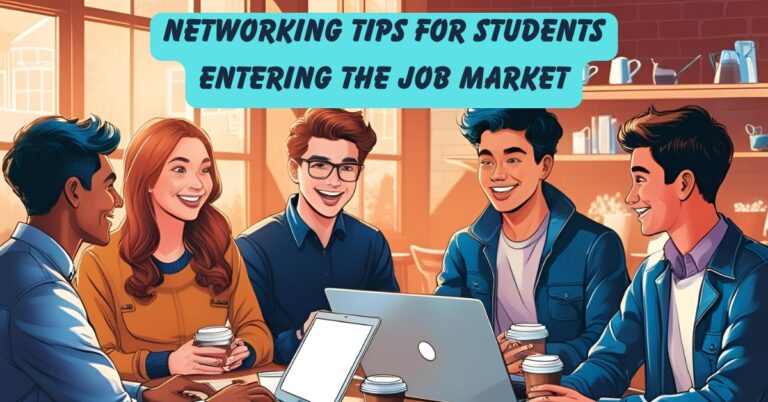Networking Tips for Students Entering the Job Market
Hey! I am Ayush Tiwari, Career Blogger | Online Earning Enthusiast | Job Market Researcher. If you want to learn from home and add value to your profile, go through this blog.
Finding a job can be tough, especially when you’re a student or fresh graduate. You may feel nervous, unsure, or even lost. I understand because I have been there too. But there’s one secret that can really help you — networking.
In this blog, I will explain what networking is, why it matters, and most importantly, how students entering the job market can build strong, useful connections step by step. These are real tips, based on my own experience and research. And don’t worry — you don’t need to be super confident or have many contacts. Even if you’re just starting, this guide is for you.
Let’s explore how you can connect, grow, and shine in today’s job world.
What is Networking and Why Should You Care?
Networking means talking to people, learning from them, and sharing your interests. It’s not just about asking for a job — it’s about building relationships that can help you learn, grow, and reach new opportunities.
When you network the right way:
-
You get advice from experienced people.
-
You hear about job openings before they are posted.
-
You understand what skills companies really want.
-
You stay motivated by talking to others in your field.
Many students think networking is only for professionals, but that’s not true. In 2025, more than ever, students who network early are ahead of others. They get internships, mentorships, and job offers faster.
Where Can Students Start Networking?
You can start networking right now, even if you’re still in college. Here’s how I began my journey and how you can do it too.
1. LinkedIn – The Student’s Best Friend
Create a LinkedIn profile. It’s like your online resume but better. Add your education, skills, and interests. Follow companies and people who inspire you. Comment on their posts. Send simple connection requests with a short message like:
“Hi, I’m a student learning web development. I liked your post on career growth. Would love to connect and learn from you.”
Start here: https://www.linkedin.com
2. Attend Webinars and Career Events
Many colleges and platforms like NCS (National Career Service) and Skill India Digital offer online events. These are great places to meet industry experts and ask questions. Try platforms like:
3. Connect with College Alumni
Your college seniors are one of the best sources of guidance. They were once students like you. Reach out to them through social media or alumni groups. Ask how they got their first job, what helped them, and what mistakes to avoid.
4. Use Internships as Networking Tools
When you do internships, don’t just complete tasks. Talk to your mentor. Learn about their career. Ask for feedback. Stay in touch even after the internship ends. These small steps create lasting professional relationships.
5. Join Student Clubs and Forums
Whether it’s a coding club, debate society, or photography group — joining clubs helps you meet like-minded people. These connections may help you later when looking for projects, jobs, or collaborations.
How to Network Without Feeling Awkward
If you’re shy or new to this, networking can feel scary. I used to feel the same. Here’s how I made it easier for myself:
-
Be honest and polite: Say you’re a student and want to learn. People are usually happy to help.
-
Listen more than you speak: Ask questions like “What helped you in your first job?” or “What skills are important in your field?”
-
Follow up: After any conversation or event, message them: “Thank you for your advice today. It really helped me.”
-
Be active: Share what you’re learning on LinkedIn or in college forums. It shows your interest and brings people to you.
Common Networking Mistakes to Avoid
Even when trying hard, many students make small mistakes while networking. Avoid these:
-
Asking for a job right away — networking is about learning, not begging.
-
Not preparing before events — know who is speaking and what to ask.
-
Ignoring follow-ups — always thank people and stay in touch.
-
Being too casual — remember, this is your future, not a group chat.
How Networking Helps You in the Long Run
Good networking doesn’t just help in getting your first job. It helps in many ways:
-
You get mentors who guide you through your career.
-
You find new job opportunities when you’re ready to switch.
-
You build a professional image that companies trust.
-
You become part of a community where learning never stops.
For example, one of my LinkedIn connections introduced me to a free webinar, where I met someone who later helped me get my first freelance project. It was all because of simple networking.
Practical Tips to Start Today
You don’t need a lot of time or experience. Just do these small things today:
-
Make or update your LinkedIn profile.
-
Message one senior or alumni from your college.
-
Join one career webinar or live workshop this week.
-
Post something useful — like a skill you learned — on social media.
-
Write down 5 people you’d like to connect with in your field.
These small actions lead to big results.
FAQs – Networking for Students
1. Is networking only useful for business students?
No, networking helps students from all fields — tech, arts, commerce, or science. Everyone can benefit by connecting with people in their career path.
2. What should I say in a connection message?
Keep it simple. Say your name, what you study, and that you’d like to learn from them. Example: “Hi, I’m a computer science student. I read your article on AI jobs. Would love to connect.”
3. How can I network without LinkedIn?
You can attend webinars, college events, or join online communities on WhatsApp, Telegram, or Facebook related to your field.
4. What if I don’t know what to talk about?
Just ask questions like “How did you start your career?”, “What’s one skill that helped you?” or “What advice would you give a fresher?”
5. How do I know if someone is the right person to connect with?
Look for people who are in your field, have experience, and are active online. If they post helpful content or respond kindly, they’re a good connection.
Conclusion – You Don’t Need to Be Big to Start, You Just Need to Start
Networking is not about being popular or famous. It’s about being curious, respectful, and willing to learn. As a student entering the job market in 2025, networking is your superpower. It’s free, it’s simple, and it can change your life.
From my own experience, I can say that good connections often bring the best opportunities. You may not see results in a day, but every step counts.
So whether you’re shy or confident, from a big college or a small town, remember — networking is for you. Start small. Stay real. Be helpful. And one day, someone will help you back.
If you found this blog helpful, share it with your classmates, seniors, or juniors. You never know who needs to read this today.
Let’s grow together!
—
Written by Ayush Tiwari
Career Blogger | Online Earning Enthusiast | Job Market Researcher
Visit my blog at Jobpao.com for more student career tips.

